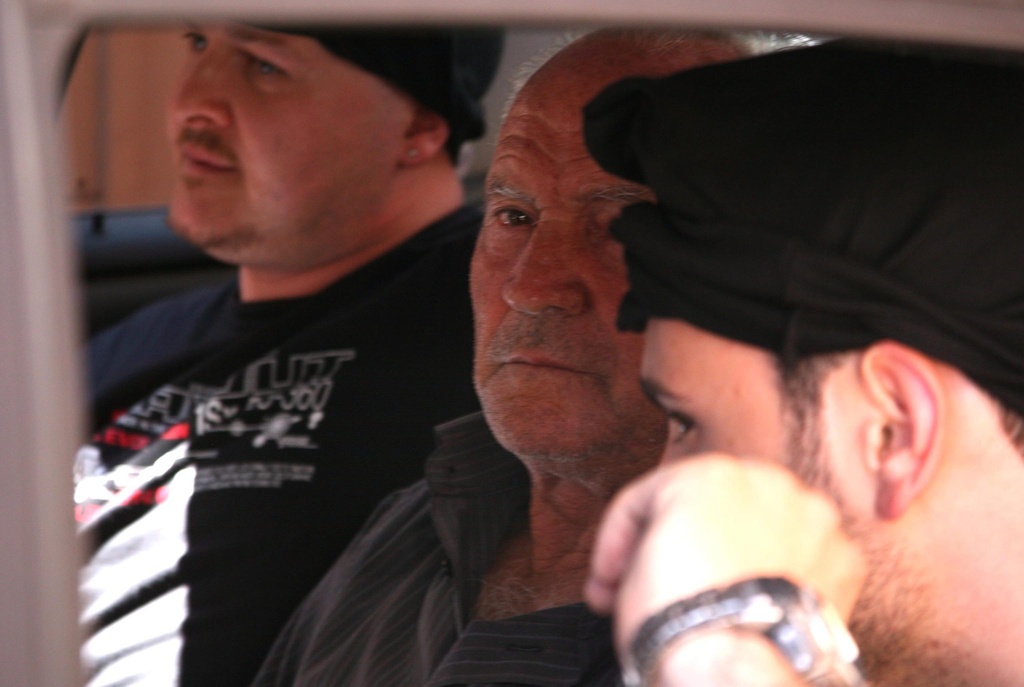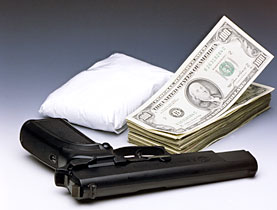Swiss tackle Italian mafia on home soil

The bloodiest arm of the Italian mafia, the ‘Ndrangheta, has moved beyond just laundering money in Switzerland to other criminal activities on Swiss soil.
That is the finding of a report now in the hands of the Swiss Federal Prosecutor’s Office.
In a recent, unprecedented police crackdown in Italy, some 300 people were arrested who were suspected of belonging to the Calabria-based ‘Ndrangheta mafia, including one of its alleged bosses, Domenico Oppedisano. One or more cells of the criminal organisation are also said to be active in Switzerland.
The report by Swiss investigative judge Jacques Ducry shows that this organisation “is carrying out specific criminal activities, in Ticino and Zurich in particular, that go beyond money laundering”.
After an investigation lasting nearly eight years, in collaboration with Milan’s anti-mafia unit, Ducry submitted the 150-page dossier to the Federal Prosecutor.
The document – which has not been released to the public – focuses on an Italian-Swiss national suspected of organising arms and drugs trafficking in Switzerland and of laundering money from his crimes through fictitious companies and Swiss bank accounts. Around 30 other people are also in the magistrate’s line of fire.
The dual national at the heart of the case is on trial in Milan and could be brought before the Swiss Federal Criminal Court to face charges for offences in several cantons.
If Ducry’s report results in a conviction, the case will confirm ‘Ndrangheta growth within Swiss borders. And not only for the sole purpose of capitalising on the Swiss financial centre.
On Friday, the head of the Swiss Federal Police, Michael Perler, told Swiss public radio that the government intends to divert resources to step up investigations into Mafia links in Switzerland, and also wants to work more closely with Italy.
Concrete fears
Piero Grasso, the Italian anti-mafia prosecutor does not, however, see the mafia actually exporting its criminal operations and violence outside Italy. “There is no such thing as a boss giving orders from abroad,” he recently said.
The facts paint a different picture though. In Zurich, where the main protagonist of the Ducry case was also active, another worrying case recently came to light.
In February, Swiss-Italian television broadcast a documentary on the presence of the ‘Ndrangheta along Zurich’s Limmat river. The film revolves around the bankruptcy of two largely unknown financial companies run by a group from Calabria, a bankruptcy that brought about the ruin of some 1,700 small investors.
The case, which has not yet been tried, is suspected of also leading to the mysterious death of a young Italian national in Zurich who was married to a Swiss. The police concluded it was suicide. The documentary suggested that the Zurich public prosecutor underestimated the seriousness of the case.
Real danger
“Minimise” and “underestimate” are words commonly used by Italian experts on organised crime when referring to the attitude of the Swiss authorities. A case in point: Varese special prosecutor Agostino Abate has repeatedly sounded the alarm. “When we see evidence of the mafia, it is often too late,” he recently told swissinfo.ch.
Shortly after taking office, Michael Perler, the new head of the Swiss Federal Police Office talked about mafia being present in the hotel industry and expressed concern at ‘Ndrangheta’s growing activities in Switzerland.
Ducry does not preclude blood being spilled in Switzerland. “Sooner or later, something like this happens. One can only hope that there will be no more deaths,” he warned, visibly worried.
Close to the border
While ‘Ndrangheta may well be rooted in Calabria, it has been reinforced in recent years in the rich region of Lombardy, bordering Switzerland. The organisation has chosen to relocate a large part of its activities to Milan.
It is also said to be active in the health sector and have control of the Ortomercato wholesale fruit and vegetables market.
Reputed to be the most secret criminal organisation, its horizontal clan-like structure makes it impenetrable. Its “men of honour” follow a code of silence when arrested, further complicating the task of investigators, who are only just beginning to decipher its overall structure.
While there may be backslapping among Italian justice authorities for the arrest of Oppedisano, back in Switzerland the fight against organised crime is proving difficult, says Paolo Bernasconi, a former prosecutor for Ticino.
The well-known law professor and lawyer says the new criminal code procedure which comes into force in 2011, will lead to a real “party for offenders”.
The new law, which he says is “too lenient”, encourages certain crimes and will therefore create a conducive environment for them.
Meanwhile Ducry also foresees difficulties that the new procedure will bring in collaborating with authorities in other countries: “The criminals will benefit.”
The ‘Ndrangheta has branched out into Germany, Canada and Australia, and most recently to Switzerland.
A defendant on trial in Milan, and central figure in the mafia organisation, could soon appear before the Federal Criminal Court in Bellinzona.
He and about 30 others are suspected of various crimes including weapons and drugs trafficking, and money laundering.
The case is the subject of a report that took nearly eight years to complete. The investigation by a federal judge, Jacques Ducry, in collaboration with Milan’s anti-mafia police has been handed into the Swiss Federal Prosecutor’s Office.
The Federal Prosecutor is likely to issue charges that would, if necessary, be tried in Bellinzona.
This is not the first time that clans and mafia have chosen to carry out some of their activities in Switzerland.
It was also the case with the “Pizza connection”, in the mid-1980s, and with the Magharian brothers and their “Lebanon connection”, in the late 1980s.
Up until 1975 the ‘Ndrangheta mainly were involved in extortion and blackmailing.
A gang war killed 300 people, and a second spate of fighting between clans lasted from 1985 to 1991, resulting in 600 deaths.
In the 1990s it became involved in the drug trade.
The ‘Ndrangheta is as rich as it is powerful.
Experts estimate its annual turnover to be around €44 billion.
The ‘Ndrangheta has the monopoly on cocaine trafficking in Europe.
The organisation has partnered with major drug lords in Latin America.
Together, they bring tonnes of cocaine through West Africa and flood the European market including Switzerland with it.
Cocaine use has increased exponentially in Switzerland over the past five years.
(Translated from French by Jessica Dacey)

In compliance with the JTI standards
More: SWI swissinfo.ch certified by the Journalism Trust Initiative












You can find an overview of ongoing debates with our journalists here . Please join us!
If you want to start a conversation about a topic raised in this article or want to report factual errors, email us at english@swissinfo.ch.